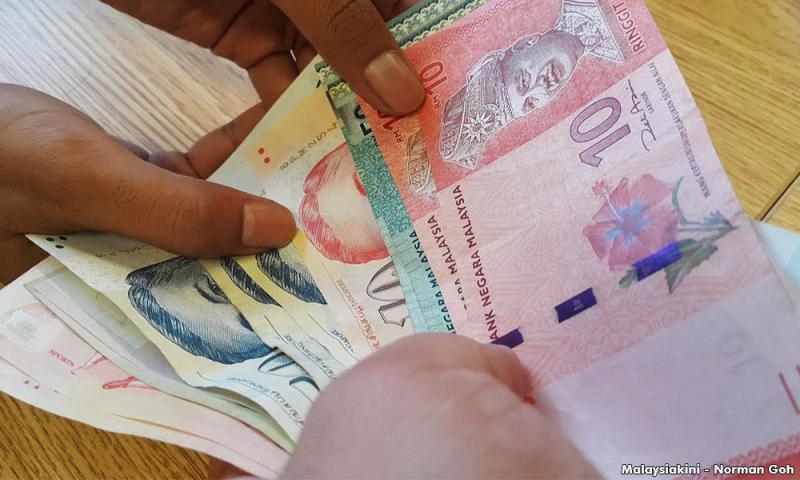The Global Wealth Report released this month shows that the US$474 billion (RM2,109.51 billion) total wealth amassed by Malaysians only consists of 0.2 percent share of the total world wealth, according to Credit Suisse Research Institute (CSRI).
The report states that the total household wealth in Malaysia has dropped US$26 billion or 5.2 percent.
Despite the report categorising Malaysia as an upper middle income group with a gross domestic product totalling US$20,100 (RM89,454.29) per adult, it classified the country's wealth data quality as "poor".
According to the report, which records the worldwide wealth generation, Malaysia's 19 million adults generated US$24,429 (RM108,720) wealth per adult in 2016, a drop of US$1,894 or 7.2 percent as compared with 2015.
Meanwhile, Singapore adults have an average wealth of US$276,885 in 2016, more than 10 times if compared with Malaysia.
The average adult in debt in Malaysia increased from US$7,054 in 2015 to US$7,462 this year.
Now in 'frontier wealth' group
The report states that Malaysia, once categorised as "intermediate wealth group" with a mean wealth in the US$25,000 to US$100,000 range, has fallen out of this category and is now in the "frontier wealth" range.
"The 'frontier wealth', ranging from US$5,000 to US$25,000 per adult, covers the largest area of the world and most of the heavily populated countries, including China, Russia, Brazil, Egypt, Indonesia, the Philippines and Turkey.
"In recent years, Malaysia and Poland have hovered near the US$25,000 lower limit, but both have now fallen below this threshold.
"Our estimates suggest that the lower half of the global population collectively owns less than one percent of the global wealth, while the richest 10 percent of adults own 89 percent of all wealth, with the top one percent accounting for half of all global assets.
"In recent years, wealth inequality has trended upwards, propelled in part by the rising share of financial assets, and a strengthening of the US dollar," the Global Wealth Report says.
In Malaysia, some 35,000 adults reported wealth of above US$1 million while 548,000 adults reported wealth of US$100,000.
Nine Malaysians recorded a total wealth above US$1 billion.
The report also acknowledged that ringgit depreciated 6.4 percent against the US dollar since 2015.
 Meanwhile, in a press statement today, PAS deputy president Tuan Ibrahim Tuan Man (photo) demanded that the government identifies the reason behind the deterioration of ringgit, the worst performing currency in Asia.
Meanwhile, in a press statement today, PAS deputy president Tuan Ibrahim Tuan Man (photo) demanded that the government identifies the reason behind the deterioration of ringgit, the worst performing currency in Asia.
"Bank Negara Malaysia and the government should be honest in identifying the reason the ringgit is being the most impacted currency.
"Don't cover up the real reason just to protect one's dignity when the people live in poor conditions due the to ringgit depreciation," Tuan Ibrahim said.
He noted that Prime Minister Najib Abdul Razak had proudly commended the performance of ringgit in April.
"This might surprised my political opponents who accused that ringgit would fall to RM4.80 against dollar if I continue to be a premier. We recorded RM3.88 against the dollar," Najib was quoted as saying by The Star Online then.
"Given that ringgit now falls to RM4.47 - the worst performing currency since the victory of US president-elect Donald Trump, the questions ringing in people's mind are if Najib had his laugh back then in April," said Tuan Ibrahim.
The economic analysts expect the ringgit to continue to drop in 2017 and some even estimated the currency will fall to RM5 against the dollar, Tuan Ibrahim said.
"If Najib continues to be prime minister in 2017, then what his opponents said in April will come true," he added.
"The prime minister had attributed his July 28, 2015, cabinet reshuffle as among the reasons for the appreciation of ringgit early this year.
"What is Najib's reaction to the value of ringgit today? What would he blame for causing ringgit's fall? If the cabinet reshuffle had led to ringgit appreciation then, does the depreciation of the currency has anything to do with the unsatisfactory cabinet's performance?.
"Has the government came up with measures to contain the increased inflation following the ringgit performance and the revocation of subsidies?" Tuan Ibrahim asked.





